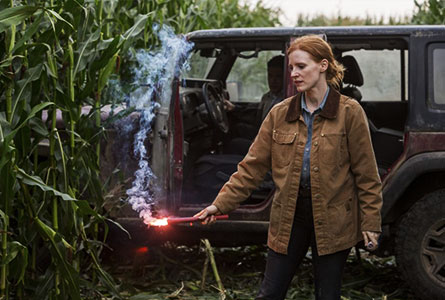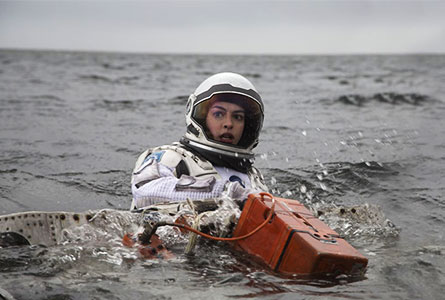REVIEW: Interstellar | Released November 7 | Directed by Christopher Nolan | Starring Matthew McConaughey, Anne Hathaway, Jessica Chastain | [usr 4]
Christopher Nolan’s sci-fi epic is his most ambitious film yet, if not necessarily his best. There are no fucking aliens in Interstellar.
That’s not a spoiler. You’d sooner find an explicit sex scene in a Yasujiro Ozu film than an alien in one by Christopher Nolan.
Nolan is fascinated by the speculative, but he abhors the supernatural. This is, after all, the same guy who made a trilogy of superhero movies in which ‘powers’ were almost exclusively expressed through societal influence. Over the course of nine feature films, only one Nolan character has openly dared to violate the laws of nature, a transgression he paid for by dying several dozen agonising deaths before ultimately being left to rot in an oversized dunk tank.
In a time when budgets have grown bottomless due to the cost of conjuring artifice, Nolan makes films which are intoxicated by the real. While that philosophy extends to his preference for practical effects and his enduring commitment to shooting on film, his hard-nosed rationalism is most explicitly seen in his singular approach to narrative structure, which has less in common with traditional storytelling than it does with scientific experimentation.
The films of Christopher Nolan generate emotion in much the same way that a supercollider generates particles, accelerating until they achieve a velocity that allows the abstract concept at their core to be seen and confirmed. Nolan may not be looking for the Higgs boson, but he uses a similar approach to distil and demystify the subatomic elements of narrative fiction. His films feverishly cross-cut between parallel planes of action until the tension generated between the temporal gamesmanship of their structure and the emotional stress of their characters synthesises into a quicksilver snapshot of a single idea — memory (Memento), sacrifice (The Prestige), justice (the Batman films), and dreams (Inception). His films don’t begin with a character, they begin with a word.
If Interstellar is Nolan’s most ambitious film, it’s not because of its cost or its intergalactic sweep, but rather because “love” is the most speculative and unscientific force that he’s ever tried to prove. When Nolan was recently quoted as saying that his new opus is about “What happens when scientists bump up against these things that defy easy characterisation and analysis — things like love”, his comment engendered skepticism from people who haven’t become fetishistically submissive to their enthusiasm for upcoming event films. And while Interstellar throws itself on the sword of sentimentality almost every time it’s on the precipice of arriving at a moment of cinematic wonder, Nolan’s approach to love is ultimately as blunt and practical as we should expect from the man who reduced the human subconscious into a rigid ladder of colour-coded game worlds. Interstellar doesn’t just contend that love is real, the film argues that it’s downright Darwinian.
Like exactly all of Nolan’s non-Batman films (and some of those, as well), Interstellar is about a middle-aged white man who desperately needs to crack a code in order to forgive himself for failing a woman. The man is Cooper (an eminently believable Matthew McConaughey), a widowed former pilot who’s raising his two kids on a corn farm in a world so inhospitable to living things that rogue drones are treated like wildlife — the Earth of the film’s near-future has experienced a vague die-off, its every withered facet an organic reflection of Cooper’s quiet grief.
The girl is Cooper’s daughter, Murph (Mackenzie Foy and Jessica Chastain, both extraordinary), a character who seems born from criticisms regarding the female characters in Nolan’s previous work. Whereas the Nolan of old would have used the memory of Cooper’s wife to drive the hero well beyond the bounds of reason, Interstellar removes the romantic element from this core relationship, replacing it with a paternal dynamic that better accommodates the responsibility burdening the film’s protagonist. What fully allows Nolan to cement this former weakness as a new strength, however, is that Murph becomes much more to this story than just a totem of lost love (Cooper’s underwritten son, on the other hand, becomes Casey Affleck).
Through a series of seemingly inexplicable events that are hard to explain but easy to demystify, Cooper and Murph find themselves face-to-face with the last remnants of NASA, personified by Dr. Brand (Michael Caine) and his daughter (Anne Hathaway). Brand remembers Cooper and his skills as a pilot, and so decides to share with him their planet’s greatest remaining secret: Earth is dying, and dwindling oxygen supplies mean that Murph’s generation will likely be humanity’s last. Unless! Unless Cooper can pilot a team of scientists — and a stubbornly cute but not too cute droid called TARS — through a conveniently placed wormhole that will allow them to explore distant, potentially inhabitable worlds without running out the clock. It’s not a suicide mission, but every true explorer knows that safety isn’t guaranteed. Cooper is forced to choose between staying with his young daughter or potentially saving our species from extinction. Faster than you can say “For All Mankind”, Cooper and his crew are gliding by the rings of Saturn on awe-inducing 70mm IMAX (don’t even bother seeing the movie in any other format).
For the first 90 minutes of Interstellar’s 169-minute runtime, the film progresses in a linear fashion, bucking the inwardly spiraling trajectory that characterizes most of Nolan’s stories. As soon as Cooper and the rest of the gang touch down on the first potential planet, however, we’re rocketed back into the sweet embrace of Nolan’s comfort zone. Several of the scripts that Christopher Nolan has co-written with his brother Jonathan begin at the fringes of fact before leaping into the wild blue yonder, Interstellar simply — and effectively — delays that jump. When the free fall begins, the film’s depiction of relative time between worlds is uncannily similar to how Inception toyed with relative time between dreams, but where that film used pseudo-science in order to derive a pornographic pleasure from the logistics of its construction, Interstellar leans on (some)actual science in order to create a strong emotional bedrock for a story that can’t possibly convey the logistics of its telling. There is no amount of clunky expository dialogue in the world that could succinctly school the average viewer on the ins and outs of theoretical quantum mechanics, and no one — not even the almighty Christopher Nolan – will ever make a Hollywood film capable of providing answers about space-time that have eluded our most brilliant scientists for years.
It’s a paradox that should completely strip this film of its purpose, but Nolan thrives in the limbo between logic and emotion, levelling the playing field between the two by riffing on the former in order to crystallise the latter (maybe he should have directed Star Trek?). Interstellar begins as a cautionary tale about climate change and the perils of overpopulation, and eventually blossoms into a galvanising call for exploration, but the greater purpose that binds its unwieldy plot together is a mercilessly practical message about how love is humanity’s best chance for continued survival.
By consulting with renowned theoretical physicist Kip Thorne, the script’s conception of gravity as the missing link between space and time is surely rooted in a foundation of fact, but to poke holes in the science of Interstellar would be fundamentally counterintuitive to how the film operates. Interstellar is pro-science, insofar as knowledge is used as a means of emotional healing. As per Nolan tradition, Cooper is psychically damaged by the wounds in his understanding, and only through learning more about the most obscure folds of his world is he absolved of his guilt and made whole.
While Interstellar is undoubtedly a tearjerker — a pivotal scene where Cooper watches video messages from home is the most baldly emotional moment Nolan has ever produced — it might be the most practical conception of love (familial or romantic) ever put on screen. In no uncertain terms, and without diminishing the power of its story until its agonizingly fumbled climax, Interstellar contends that love is nothing more than an essential mutation, and that our instinct for self-preservation will rot and spell the end for our species if it goes unshared. It’s survival of the fittest, but the fittest are only defined as such because they look out for each other.
The jaw-dropping imagery with which Interstellar depicts the vastness of space serves to reinforce our collective smallness, and the insane risks that we take in order to protect the people important to us. Leveraging the ambition of 2001: A Space Odyssey with the pathos of The Right Stuff, the graphics ofGravity, and the fever dreams of modern physicists, Interstellar produces some of the most exhilarating illustrations of space travel since A Trip to the Moon. Augmented by Hans Zimmer’s exceptional and uncharacteristically measured score (some of which sounds like Philip Glass if he were sedated and launched into orbit), the scenes set in the final frontier are astounding. While the various planets are convincingly realised — though limited by their barrenness — Nolan conceives of the void between them with a practical and painterly approach. In that regard, Interstellar has the feeling of a film that was built to last, particularly when contrasted against the glossy pyrotechnics of Alfonso Cuarón’s weightless suspense saga.
On the other hand, Interstellar benefits from its epic length just as much as Gravity did from its brevity. The story hinges on being able to make the years that slip through its cracks feel genuinely palpable, an effect it accomplishes through sheer duration. In a film defined by the raw utility of its parts, even the running time has its own purpose. Not all of that time, however, is particularly well spent. While Interstellar taps into a Spielbergian sense of wonder that Nolan has never broached before (this project was initiated under Spielberg’s command), the film struggles to reconcile that awed reach into the unknown with its director’s own trademarks.
Interstellar aspires to the same cross-cut crescendo that made the last hour of Inception so momentous, but it doesn’t have the ingredients required to reproduce that feeling. This failure is largely due to Affleck’s character, who’s essential in broad strokes but inert when brought to the fore. The clumsy closing minutes are plagued by similar symptoms, providing closure to the film’s themes at the expense of its grace. For all of its awkward missteps, however, Interstellar finds Nolan throwing down the gauntlet at the feet of his contemporaries with a newly confrontational zeal.
Interstellar is by far the best and most comprehensively satisfying big-budget spectacle of the year… and that’s a serious problem. The cosmic margin by which Christopher Nolan’s latest film eclipses its competition forces it to double as an unsettling reminder of how unimpressive such a feat has become. Nolan has made a career of exposing the poverty of our current blockbuster cinema, and not since Inception has a film of this size evinced a narrative ambition on par with that of its scale (with the possible exception of independently financed bomb,Cloud Atlas), but it was never going to be any other way.
If Nolan paints with too broad a brush for the film to function as trenchant sociopolitical commentary, Interstellar is nevertheless a sweeping condemnation of complacency. By virtue of their economics displacement, every blockbuster is a comment on the circumstances of its making, and while Interstellar can only guess at quantum mechanics, it reflects the state of commercial cinema with a scientific accuracy. Interstellar may not take us to new heights, but its reach is nevertheless an urgent reminder that the movies will suffocate if we don’t try to get there. Just because we’re still alive doesn’t mean that we’re not dying. Interstellar illustrates why Nolan’s most ardent fans think that he can take us forward, but it also proves that Nolan can’t do it on his own.
Culled from Little White Lies







